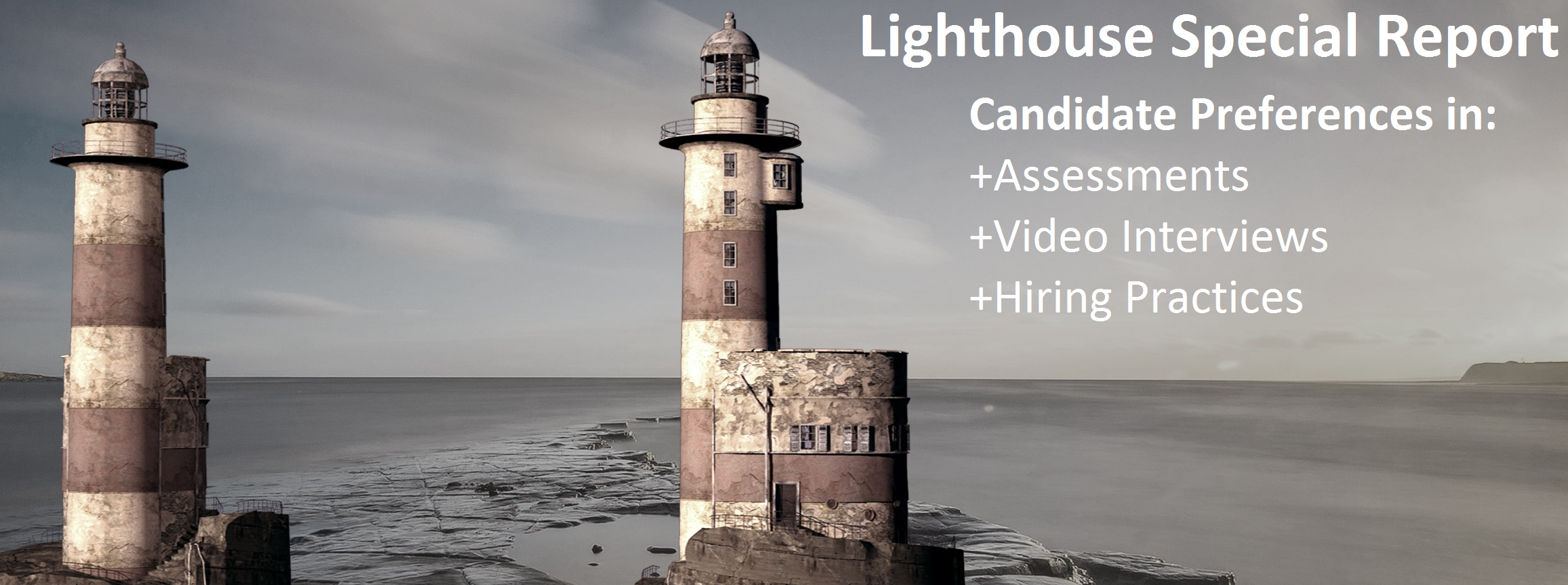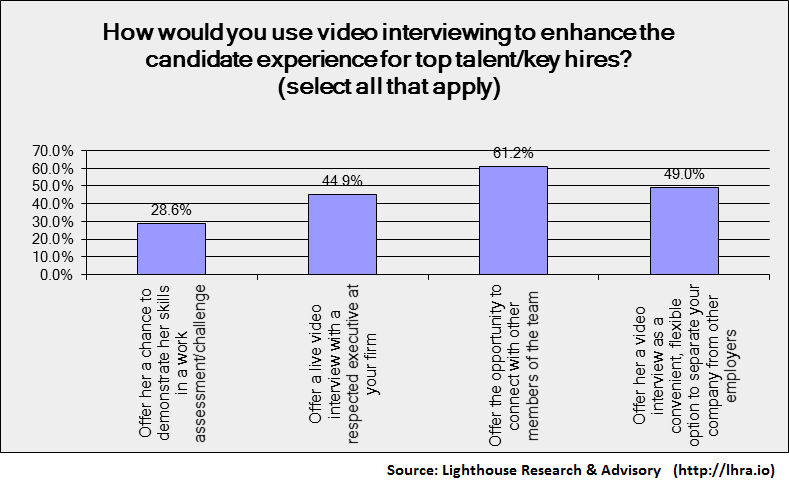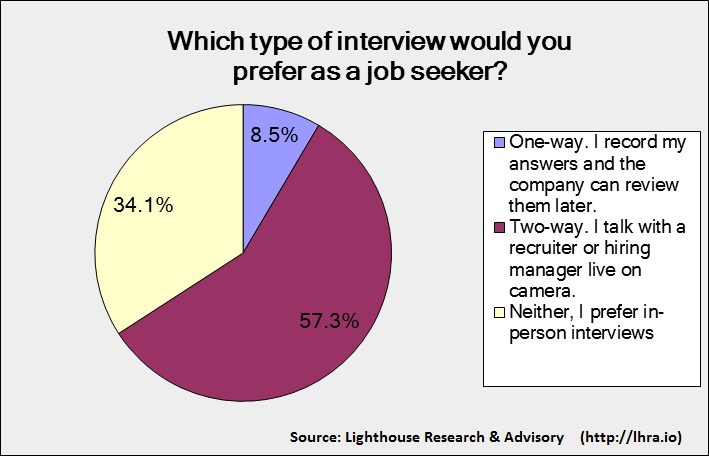[Updated July 2021 with new insights]
In some ways, hiring looks very similar to what it did twenty years ago. People search for positions, indicate interest, and are filtered down until the most promising candidate is offered a job. However, the technology we use has upgraded considerably over time. Today employers have tools to increase efficiency and efficacy, including video interviews, automated assessments, and more.
In a recent Lighthouse Research study, we explored some of the key aspects of hiring with video technology from both candidate and employer perspectives. The pulse survey reached more than 250 individuals and employers, uncovering some interesting findings that both validated existing beliefs as well as uncovered some new insights. Here’s what we found out.

Key Findings
- Stress Factor: Nearly 8 in 10 job seekers say that video interviews are as stressful or more stressful than in-person interviews.
- Attracting Top Talent: 61% of companies say that peer interviews and interactions would be the best way to attract top talent with video hiring solutions.
- Candidate Preferences: Nearly 25% more job seekers said they would prefer a live video interview to an in-person interview.
- Candidate Assessment Perspective: Just under two-thirds of candidates think the right kind of assessments—those that give them an opportunity to showcase their skills or a work sample—prove their value in the hiring process.
- Candidate Experience: Candidates believe that resumes are just as valuable as employment tests/assessments (25% each), but half of candidates say that video interviews are the most valuable tool for helping them stand out in the hiring process.
A Stressful, but Valuable, Experience
Interviews, by nature, are stressful experiences by design. Companies know it. Candidates know it. But did you know that job seekers think the video interviewing experience is more challenging? According to the study, 43% of job seekers say video interviews are more stressful than in-person interviews.
For a mid-career professional with several jobs behind them, the person could have participated in five to ten or even more interviews over the course of time. When it comes down to it, getting in front of a camera is a nerve-wracking experience for most people. It’s just not something they are comfortable with.
At first glance, this seems contradictory. After all, do we really think that stressful experiences are a good thing? However, it quickly becomes apparent by looking at the data—candidates believe that video interviews are valuable tools to help them stand out in the hiring process. When asked what helps them stand out in the hiring process, candidates ranked a video interview higher than both resumes and employment assessments.
This is similar to what we see in sports with competition performance. Competitions are inherently stressful experiences, yet athletes look forward to them because they have the opportunity to demonstrate their level of performance. Video interviews are the same way for candidates—while they may be stressful, they also provide a foundation to show off applicable skills, personality traits, and other aspects, hopefully leading to a job offer.
Talent Magnetism: Attracting the Best
Despite that perception of increased stress, companies have the opportunity to make video interviewing less strenuous. When prompted, candidates ranked the following reasons they value video interviewing:
- 58% want the opportunity to connect with peers and team members via video
- 54% said the ability to schedule at convenient times was paramount
- 49% think it would be valuable to interview with a member of the executive team
On the company side, this holds true for attracting top performers as well. Six in ten employers said that peer interviews and interactions would be the best way to attract and engage a key candidate. In addition, 49% of companies said that video interviewing was a flexible option to help them stand out among other competitive employers.
Figure 1: How Companies Attract Top Performers with Video Interviews

Source: 2016 Lighthouse Research Video Interview and Assessment Pulse Survey (n=264)
The data shows that video interviews have the ability to not only help the company stand out in general, but it also points to some methods that might specifically create better results, including:
- Offering opportunities for candidates to demonstrate relevant skills during an assessment or challenge
- Giving peers the chance to talk with candidates about team dynamics, company culture, and other key topics that A players are concerned with
- Dedicating an influential executive to do live video interviews with key candidates, demonstrating the value the firm places on those particular individuals
When it comes down to it, high-performing talent has the ability to command a position wherever desired in many cases. Companies with a slow, disorganized, or unpleasant hiring process are likely to lose out to the competition when it comes to attracting and engaging this type of candidate.
Assessments Matter to Candidates as Well
The common belief, anecdotally, is that candidates do not like hiring assessments. While this may be true in general, the type of assessment is key to shifting the reaction to these tools. When asked, 63% of candidates think that work samples and demonstrations are valuable additions to the hiring process. In addition, 25% of candidates said that this type of assessment helps them to stand out the most in the hiring process.
A common challenge with interviews, whether video or in-person, is the low validity of the medium. In general, interviews alone are not the best predictor of a candidate’s ability to do the job. However, when combined with assessments, companies can have a much clearer picture of a candidate’s suitability for the job. Unfortunately, nearly one-third of companies are not using any assessments in the selection process, leaving valuable information about candidate fit and suitability out of the hiring decision.
There is a clear opportunity to bring both groups together. Candidates want an opportunity to showcase their abilities, not take a general skills or cognitive assessment. And companies need additional data to help support the right hiring decisions, avoiding the bad hire trap caused by a lack of clarity. 42% of companies that use hiring assessments said that work samples and simulations are the most valuable, topping options such as behavioral tests, skills assessments, and others.
Candidates Prefer Video Interviews
While it may seem to contradict the amount of stress involved, 49% of candidates say a video interview helps them to stand out in the hiring process. To contrast, just 25% of candidates think a resume is the best way to set themselves apart. The most compelling data from the study comes in the form of candidate preferences. When asked, candidates said they preferred video interviews to in-person interviews by a margin of nearly 25%.
Figure 2: Candidate Interview Preferences

Source: 2016 Lighthouse Research Video Interview and Assessment Pulse Survey (n=264)
For companies, this represents an opportunity to target the candidate experience in a new way, delivering a flexible, convenient opportunity for candidates to interview with your organization. And while one-way, asynchronous interviews didn’t fare as well in terms of candidate preferences, there are still opportunities to leverage them within the process. Technically the one-way option can’t make up the entire hiring process, because companies need a dialogue at some point to make a hiring decision.
As a counterpoint, companies like the automation aspect of being able to record one-way, asynchronous interviews with candidates as a way to save time and resources for other, more pressing strategic needs. 26% of employers said that blocking off time and reviewing multiple candidates at once was a key value proposition of asynchronous video interviews. Even more valuable, though, is the fact that the video interview allows companies to evaluate candidate personality and culture fit beyond a static resume. 45% of employers said this was the most valuable purpose of a video interview.
The bottom line here is that candidates crave video interviews, and they also believe they are important elements in the hiring process, despite the level of stress that is tied to the practice. At the same time, companies see the value in the practice and know there are competitive advantages to using video hiring tools. As the figure below demonstrates, there is a tremendous amount of synergy between both candidates and employers when it comes to beliefs about video interviewing and assessments.
Figure 3: Candidates and Companies in Alignment
| Factors | Candidate Responses | Company Responses |
| Stress | 43% believe video interviews are more stressful than in-person interviews | 36% believe video interviews are more stressful experiences for candidates |
| Candidate Experience | 58% say peer interactions are the most valuable aspect of video interviews | 61% say peer interactions would be most valuable for attracting top talent |
| Assessment Preferences | 36% think work samples and simulations are best for accurately assessing abilities | 42% think work samples and simulations are best predictors of candidate fit |
| Value | 49% say a video interview would help them stand out most in the hiring process | 45% say video interviews are most valuable for identifying the right candidates to pursue |
Source: 2016 Lighthouse Research Video Interview and Assessment Pulse Survey (n=264)
Key Takeaways
- Companies should leverage video interviews not only for the inherent automation value they provide, but to attract and engage candidates throughout the hiring process, creating a competitive hiring advantage.
- Companies should think about video interviews differently–this is more than simply moving in-person interactions to video. From incorporating peer interviews to providing access to executives to appeal to top talent, there are many options for improving the candidate experience.
- Candidates actually desire video interviews and assessments that allow them to demonstrate competencies, despite being stressed out by the video interviewing experience. Providing these creates a positive experience for candidates and offers more robust selection data for employers.

Ben Eubanks is the Chief Research Officer at Lighthouse Research & Advisory. He is an author, speaker, and researcher with a passion for telling stories and making complex topics easy to understand.
His latest book Talent Scarcity answers the question every business leader has asked in recent years: “Where are all the people, and how do we get them back to work?” It shares practical and strategic recruiting and retention ideas and case studies for every employer.
His first book, Artificial Intelligence for HR, is the world’s most-cited resource on AI applications for hiring, development, and employee experience.
Ben has more than 10 years of experience both as an HR/recruiting executive as well as a researcher on workplace topics. His work is practical, relevant, and valued by practitioners from F100 firms to SMB organizations across the globe.
He has spoken to tens of thousands of HR professionals across the globe and enjoys sharing about technology, talent practices, and more. His speaking credits include the SHRM Annual Conference, Seminarium International, PeopleMatters Dubai and India, and over 100 other notable events.
